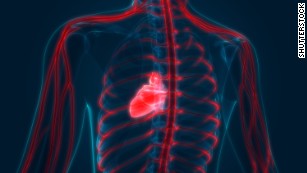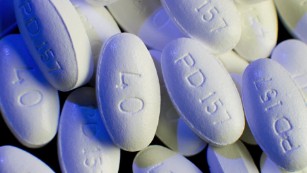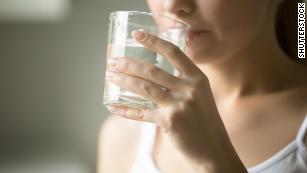And this reason to not do any type of soda:
Dementia Linked To Beverage Drunk By 50% Of People Every Day
The latest here:
Drinking two or more diet beverages a day linked to high risk of stroke, heart attacks
(CNN)More bad news for diet soda lovers: Drinking two or more of any kind of artificially
sweetened drinks a day is linked to an increased risk of clot-based
strokes, heart attacks and early death in women over 50, according to a new study by the American Heart Association and American Stroke Association.
The risks were highest for women with no history of heart disease or diabetes and women who were obese or African-American.
Previous research has shown a link between diet beverages and stroke, dementia, Type 2 diabetes, obesity and metabolic syndrome, which can lead to heart disease and diabetes.
"This
is another confirmatory study showing a relationship between
artificially sweetened beverages and vascular risks. While we cannot
show causation, this is a yellow flag to pay attention to these
findings," said American Academy of Neurology President Dr. Ralph Sacco,
who was not involved in the latest study.
"What
is it about these diet drinks?" asked lead study author Yasmin
Mossavar-Rahmani, an associate professor of clinical epidemiology and
population health at the Albert Einstein College of Medicine in the
Bronx, New York. "Is it something about the sweeteners? Are they doing
something to our gut health and metabolism? These are questions we need
answered."
Weight and race increased risk
More than 80,000 postmenopausal US women participating in the Women's Health Initiative,
a long-term national study, were asked how often they drank one
12-fluid-ounce serving of diet beverage over the previous three months.
Their health outcomes were tracked for an average of 11.9 years,
Mossavar-Rahmani said.
"Previous
studies have focused on the bigger picture of cardiovascular disease,"
she said. "Our study focused on the most common type of stroke, ischemic
stroke and its subtypes, one of which was small-vessel blockage. The
other interesting thing about our study is that we looked at who is more
vulnerable."
After controlling for
lifestyle factors, the study found that women who consumed two or more
artificially sweetened beverages each day were 31% more likely to have a
clot-based stroke, 29% more likely to have heart disease and 16% more
likely to die from any cause than women who drank diet beverages less than once a week or not at all.
The
analysis then looked at women with no history of heart disease and
diabetes, which are key risk factors for stroke. The risks rose
dramatically if those women were obese or African-American.
"Women
who, at the onset of our study, didn't have any heart disease or
diabetes and were obese, were twice as likely to have a clot-based or
ischemic stroke," Mossavar-Rahmani said.
There was no such stroke linkage
to women who were of normal weight or overweight. Overweight is
defined as having a body mass index of 25 to 30, while obesity is over
30.
"African-American women without
a previous history of heart or diabetes were about four times as likely
to have a clot-based stroke," Mossavar-Rahmani said, but that stroke
risk didn't apply to white women.
"In white women, the risks were different," she said. "They were more 1.31% as likely to have coronary heart disease."
The
study also looked at various subtypes of ischemic stroke, which doctors
use to determine treatment and medication choices. They found that
small-artery occlusion, a common type of stroke caused by blockage of
the smallest arteries inside the brain, was nearly 2½ times more common
in women who had no heart disease or diabetes but were heavy consumers
of diet drinks.
This result held true regardless of race or weight.
Only an association
This
study, as well as other research on the connection between diet
beverages and vascular disease, is observational and cannot show cause
and effect. That's a major limitation, researchers say, as it's
impossible to determine whether the association is due to a specific
artificial sweetener, a type of beverage or another hidden health issue.
"Postmenopausal
women tend to have higher risk for vascular disease because they are
lacking the protective effects of natural hormones," North Carolina
cardiologist Dr. Kevin Campbell said, which could contribute to
increased risk for heart disease and stroke.
"This
association may also be contributed to by rising blood pressure and
sugars that were not yet diagnosed as hypertension or diabetes but
warranted weight loss," thus leading the women in the study to take up
diet beverages, said Dr. Keri Peterson, medical advisor for the Calorie
Control Council, an international association representing the low- and
reduced-calorie food and beverage industry.
Yet,
said Sacco, who is also chairman of neurology at the University of
Miami's Miller School of Medicine, the more studies there are coming up
with the same associations, "the more you begin to question. The more
you begin to feel strongly about the association being real."
Critics
also point to the possible benefit of artificially sweetened drinks for
weight loss, a critical issue considering the epidemic of obesity in
the United States and around the world.
For example, two World Health Organization meta-analyses of existing research on non-sugar sweetners called those studies "low-quality and "inconclusive," said William Dermody Jr., vice president of media and public affairs for the American Beverage Association, a trade organization.
"Low-
and no-calorie sweeteners have been deemed safe by regulatory bodies
around the world," Dermody said, "and there is a substantial body of
research that shows these sweeteners are a useful tool for helping
people reduce sugar consumption.
"We
support the WHO's call for people to reduce sugar in their diets, and
we are doing our part by creating innovative beverages with less sugar
or zero sugar, clear calorie labeling, responsible marketing practices
and smaller package sizes."




No comments:
Post a Comment